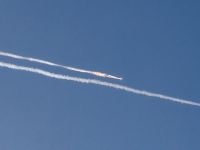Ministers and officials from 42 countries and nine organizations converged on Riyadh Thursday, the eve of the 7th International Energy Forum aimed at bridging the gap between producers and consumers.
Saudi Oil Minister Ali al-Nuaimi said the three-day forum, which convenes Friday, was aimed at "opening up channels of contacts and understanding between producers and consumers.
"The basis of cooperation is frankness and transparency without leveling accusations and counter-accusations," Nuaimi told the official Saudi Press Agency, blaming taxes imposed on oil products by western governments for the high price of crude.
But he added that Saudi Arabia wanted "cooperation between producers and consumers to guarantee the stability of the oil market and benefit the world economy and help it continue to grow".
Around 377 delegates were expected to attend the forum, including ministerial delegations from Britain, France, Japan, Mexico, Norway, Russia, South Africa and the United States, the world's biggest consumer.
The Saudi Gazette picked up on Nuaimi's theme in an editorial blaming speculators for forcing up oil prices and warning of the potential for a collapse.
"The world oil market is held captive by the derivatives market," the English language daily said.
"Speculators in the derivatives markets could bring about the world's next financial catastrophe. If oil prices are pushed substantially above current levels by speculation -- paper demand for non-existent paper barrels -- the effect on the world economy could be disastrous."
Organizations represented at the forum include the Organization of Petroleum Exporting Countries (OPEC), the UN Development Program, the World Bank, the International Energy Agency (IEA), the European Commission (EC), the Asia-Pacific Economic Commission (APEC) and the Association of South East Asian Nations (ASEAN).
OPEC has come under mounting pressure to hike production to help bring down crude prices from 10-year highs, which have sparked widespread consumer protests, notably in Europe, and warnings of a global economic slowdown.
The 11-member cartel, however, all but ruled out on Monday allowing a price-band mechanism that would pump an extra 500,000 barrels a day into the market to go ahead for fear of flooding the market.
Oil prices, averaging well above 30 dollars a barrel, have remained above the price band of 22-28 dollars despite OPEC's four production increases this year.
Analysts also expect the delegates to discuss the calls by producers for western governments to cut taxes on oil products and by consumers for oil-producing countries, especially in the Gulf, to open up their sectors to foreign investment.
The forum, held under the banner, "energy partnership in the new century", was last staged in 1998 in South Africa.
Crown Prince Abdullah Abdul Aziz will open the meeting on Friday evening in a grand hotel in the capital of Saudi Arabia, the world's largest oil producer which also boasts the biggest proven reserves – RIYADH (AFP)
© 2000 Al Bawaba (www.albawaba.com)







